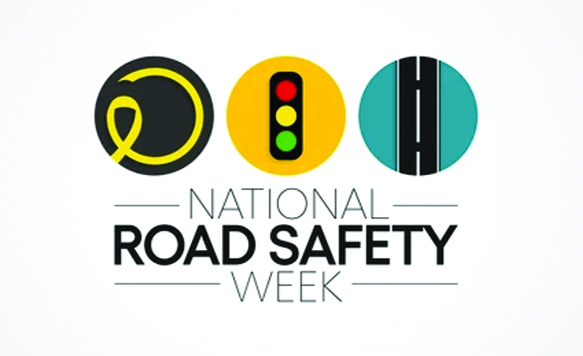By Prof (Dr.) Vikas Sharma and Komal Sudan
National Road Safety Week is an annual event in India designed to promote awareness about road safety and minimize road accidents. Observed during the first week of January, this initiative is organized by the Ministry of Road Transport and Highways, highlighting the shared responsibility of individuals, organizations, and governments in ensuring safer roads for all. Road safety slogans are straightforward and memorable phrases that advocate for safe driving practices, serving as an effective means to promote awareness and encourage safe behaviors on the road. Here are some impactful slogans:
* Stay alert today to survive tomorrow
* Better late than never
* Speed thrills, but can kill
* Fast driving could be your last drive
* Normal speed meets all needs
* Prevent accidents before they prevent you
* All accidents can be avoided
* Drinking and driving is deadly
* Leave earlier, drive slower, live longer
* Accidents are caused, not random
* Follow traffic rules, secure your future
* Drive responsibly this holiday season
Importance of Road Safety: Road safety is a significant public health issue. According to the World Health Organization (WHO), road traffic injuries are the primary cause of death for those aged 5 to 29. Recent national statistics reveal that around 1,264 accidents and 462 fatalities occur daily, averaging 53 accidents and 19 deaths each hour. The impact of road accidents extends beyond the loss of life, imposing a huge economic burden on nations due to healthcare costs, loss of productivity, and infrastructure damage. The main objectives of National Road Safety Week include raising public awareness about traffic regulations, promoting responsible behavior, and encouraging infrastructure improvements for enhanced safety. This campaign aims to ensure that everyone—drivers, passengers, and pedestrians—understands their role in accident prevention. The week features various activities such as workshops, road safety drills, educational campaigns, and rallies.
Key Themes: The fundamental aim of National Road Safety Week is to advocate for safe driving habits, elevate public awareness, reduce high rates of road accidents, and foster a culture of safety among all road users. Each year, the campaign adopts a specific theme focusing on various aspects of road safety. For example, the theme “Be a Road Safety Hero” encourages individuals to take action to improve traffic safety and support victims of accidents. Some common focal points include:
* Speed management: Highlighting the risks of speeding and the importance of adhering to speed limits.
* Preventing drunk driving: Educating the public on the dangers of driving under the influence.
* Safety for pedestrians and cyclists: Increasing awareness about the vulnerabilities of non-motorized road users.
* Use of seatbelts and helmets: Promoting consistent use of safety equipment to reduce injury severity in accidents.
Activities During National Road Safety Week: Diverse programs are organized during National Road Safety Week targeting different societal segments. Educational institutions host workshops and seminars to teach students about road rules and the dangers of negligent driving. Local governments and NGOs often hold street plays, music events, and awareness rallies to engage the community about road safety risks. Media platforms, including television, radio, and social media, play crucial roles in disseminating road safety messages. Events like memorials and night marches honor victims of road accidents, reminding everyone of the consequences of unsafe roads.
Role of Technology in Enhancing Road Safety: Technological advancements significantly contribute to improving road safety. Modern features such as automatic braking systems, lane departure warnings, and advanced traffic management systems help prevent accidents and facilitate quick responses to incidents. Smartphone applications provide real-time traffic updates, enhancing safety measures. Governments are increasingly investing in Intelligent Transport Systems (ITS) to optimize traffic control, monitor speed limits, and deploy surveillance tools like speed cameras and red-light cameras.
Citizen Responsibility: While governments and organizations are responsible for implementing essential safety measures on roads, individuals also share this responsibility. Every driver must adhere to traffic laws and avoid distractions like mobile phones while driving. It is critical to refrain from aggressive driving, neglecting seatbelts, and misusing child safety seats. Pedestrians should use designated crossings and exercise caution near vehicles. Cyclists and motorcyclists are advised to wear helmets and ensure their bikes are equipped with reflector lights among other safety precautions. Despite these combined efforts, challenges such as lack of awareness, enforcement problems, and infrastructure shortcomings still exist. Overcoming these obstacles requires a comprehensive approach involving enhanced education, stricter enforcement, infrastructure upgrades, and community involvement.
In conclusion, National Road Safety Week transcends mere awareness; it is a rallying call for individuals to play a part in making our roads safer. By fostering awareness, encouraging responsible behavior, and utilizing technology, we can strive toward achieving zero fatalities on our roads. Our present commitment to road safety will shape the legacy we leave for future generations. Let us commit to improving road safety, one step at a time.
(The authors are from the Division of Biochemistry, FBSc., SKUAST-Jammu)


Leave a Reply